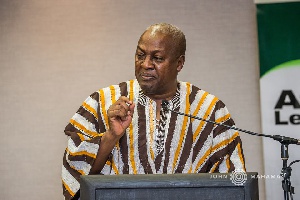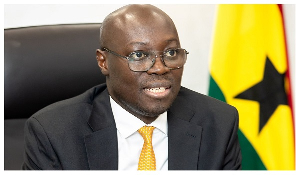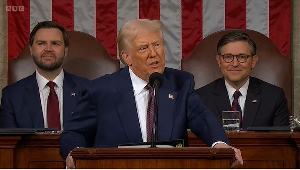Former President John Dramani Mahama has stated that the greatest threat to Africa’s peace and security is the very rapid rate of population growth.
According to Mr. Mahama, this should be of serious concern, considering that the population of Africa growing faster than all the other continents.
“ It is estimated that nearly 60% of the world’s growth will occur on our continent by the year 2050. Africa’s unbridled population growth is likened to a slowing train, it will cover some distance before it finally comes to a stop.
While fertility rates and birth rates are falling in many countries, it will take a while before Africa’s population growth is brought under control.
In many countries, the rate of economic expansion is not rapid enough to guarantee or sustain prosperity and basic social services to the people.” He said
Speaking at a public lecture as part of the 7th TANA high-level forum on security in Africa Bahir Dar University in Ethiopia, Former President Mahama stated that unemployment remains a major security threat to our continent as there are no jobs to accompany the growing population.
“It is the case across the world, but on our continent, we have a more difficult challenge because of a lack of proper skills training to enable the production of independent young entrepreneurs. Currently, more than 40% of Africa’s population is under 15 years of age. Can we take advantage of this demographic reality, or will it, unattended to, like a ticking time bomb, blow up in our faces? The continent of Africa is reeling from the effect of millions of restless unemployed youth.”
‘‘if the teeming youth of Africa must find jobs at home and stop attempting the dangerous crossing of the Mediterranean to enter the greener pastures of Europe, then we must review the role Africa plays in world production.” He added.
Read full speech below
PUBLIC LECTURE AS PART OF THE
7TH TANA HIGH-LEVEL FORUM ON SECURITY IN AFRICA
Bahir Dar University Friday April 20, 2018 TOPIC: SELF-RELIANCE IN AFRICA’S SECURITY SECTOR
HE John Dramani Mahama
Former President of the Republic of Ghana
Your Excellency Olusegun Obasanjo, Board Chairperson of the TANA Forum Members of the Board of the TANA Forum Dr. Firew Tegegne, President of Bahir Dar University ,Professor Tassew Woldehanna and Professor Funmi Olonisakin, our discussants for tonight Your Excellences Ladies and Gentlemen Let me thank President Obasanjo, Michelle and her colleagues at the TANA Forum Secretariat for the excellent preparations and coordination with the Ethiopian Government, the Bahir Dar
University and other partners towards the organization of this Forum.
At a personal level, I should indicate how privileged I am to join you all tonight, and have the
opportunity to share some thoughts on “Self-Reliance in Africa’s Security Sector”.
Speaking on such a topic to experts with considerable knowledge of the field and academics of many years is a challenge, even for a former President and politician who has a second job
talking to convince people. I will however do my best.
Ladies and Gentlemen, ‘self-reliance’ has been one of the most pursued goals on our continent,
but disappointingly still remains elusive. While the world has increasingly become
interdependent, it is important for nations to achieve self- reliance in some critical areas such
as defence, food security, sustainable economies etc., if they are to maintain their dignity and
respect.
The good news though is that, our current crop of African leaders and our growing institutions
appear to show a greater commitment than ever before to achieving self-reliance through various interventions including institutional reform. What has become evident is that the two critical pillars of self-reliance are anchored on one’s own effort and one’s own ability. It therefore calls for the building of trust and reliance on one’s own effort and ability to pave the way for achieving self-reliance.
It is clear from a review of significant literature on the subject that self-reliance is about selfdetermination; it is about independence and ability to decide one’s own destiny. It is also about
maintaining a degree of autonomous policy space to frame and enforce policies as well as build
indigenous capacities to do that. Obviously, the concept of the TANA Forum exemplifies that quest to build indigenous African
capacity in the area of Peace and Security, and the Ethiopian Government deserves to be
roundly commended for this effort.
The coordination with the African Union and other partners should sooner than later lead the
development of the much-needed capacity, both financially and logistically, at the level of the
continental union to be abreast of and in control of Security on our continent.
Your Excellences, Ladies and Gentlemen,
The Pan-Africanist Movement has since its early days relied on ‘collective self-reliance’ as the
burning desire, which motivated and enabled our forebears struggle for independence.
The Organization of African Unity, and later the African Union, are the embodiments of this
aspiration. In the early years following the formation of the OAU, there was a strong demand
by some progressive countries including my own country Ghana, led by our first President Dr. Kwame Nkrumah, calling for the establishment of an African Standby Force generally referred to as the African High Command.
These early calls recognised the need for Africa to design and control its own peace and
security architecture. It is a tragedy that despite efforts to follow through on this idea, Africa
still does not have a rapid deployment force to intervene early in situations where there is
threat of conflict.
The long struggle for decolonization and political independence could not have come to
fruition without the conscious desire for, and concerted action to ensure, self-reliance.
It was indeed this consciousness that generated the 1960’s moment of optimism. It is however a fact we must all admit to, that during and after the Cold War, we were not fully committed and able to extricate ourselves from external meddling and dependence on
external powers. A multipolar world meant that African countries relied for security support on the super power they were aligned to ideologically. All this was despite the high-profile
summits of the now almost defunct Non-Aligned Movement.
As a matter of fact, there was a mismatch between rhetoric and deeds. African nations,
economies and institutions became so dependent on foreign aid and assistance, to the extent that many were unable to render even the most basic services to our people without foreign support.
Africa more and more became dependent on the global financial institutions and donations from Western nations. The so-called period of Structural Adjustment and the ensuing political, social and economic destabilization exacerbated external meddling and dependence on foreign hand-outs.
The period of the 1980s and early 90s were simply characterized by the notion of so-called ‘Afro-pessimism’ when hopes and aspirations were dashed by civil wars, genocide, rampant and worsening levels of poverty. Africa was generally regarded as a basket case.
But even in this era, we did see some admirable efforts at self-reliance in resolving issues of
conflict on the continent. A stellar example is the history of ECOMOG in resolving the civil war
in Liberia. A historic and bold decision by leaders of the time to insert an intervention force into the raging
Liberian civil war saved thousands of lives and provided sanctuary for many vulnerable citizens.
This military intervention followed by several rounds of negotiations eventually led to a
resolution of the conflict. The ECOWAS initiative was eventually taken over by the UN and rehatted as UNMIL. In the following decades, the deployment of ECOMIB in Guinea Bissau, by ECOWAS, was again
a commendable effort by the West African sub-region.
ECOMIB’s presence in Bissau saved a rapidly deteriorating situation and helped that nation steer itself back onto the path of democratic consolidation.
Other examples such as AMISOM deployed in Somalia by the AU with the blessing of the UN
was another encouraging effort by Africa to assert self-reliance in resolving challenges of peace
and security by its own effort. One of the major constraints to these efforts has however been funding. The ECOMOG operation was funded by the troop contributing countries and left many West African economies strangulated. Resources meant for critical social care was diverted into sustaining
the troops in Liberia.
Big brother Nigeria’s oil rich economy came in handy at this time, picking up some of the associated overhead costs of that operation. Again, only recently in Gambia, the intervention of ECOWAS in diffusing an election stand-off, which could have deteriorated into conflict was applauded by the world as an admirable effort in self-reliance with regard to regional solutions to regional problems.
This was however not the same in Mali and the Central African Republic (CAR) where it took the intervention of France to arrest deteriorating security situations.
The coming of the new millennium and a transformation of the OAU to the AU heralded the replacement of some old principles, institutions, and practices with new ones.
Principles such as non-indifference and institutions such as the African Peace and Security Architecture (APSA) appear to be enough reasons to be optimistic about the future of our continent.
The issue of self-reliance continues, however, to be elusive and Africa is still vulnerable to
unwarranted external meddling.
Sad to say, but our only continental organization, the African Union, still relies on external funding for a significant part of its operational and programme budgets. If we are to speak the truth to each other, and challenge ourselves for the future, we cannot, ladies and gentlemen, continue to let outsiders pay the piper, and expect them to play an African tune. It will, therefore, not be realistic to talk about self-reliance unless we start to take care of own business, as Africans, both in terms of financing and innovative ideas.
This is why the recent recommendations and reform initiatives must be embraced by all African states. Africa needs better institutions and ways of generating sustainable financing to tackle many of its problems and shortcomings.
Self-reliance must be realised not only within the space of Peace and Security, but also in other
critical areas such as economy, agriculture, transport, technology, especially in ICT.
There is an urgent need to ensure more effective integration and reliance on each other so that Africa can stem the massive external outflows that leave the continent each year.
At this point, let me congratulate the African Union and our continental leaders for the many innovative reforms being rolled out, and particularly for the historic launch and commencement ceremony of the African Continental Free Trade Area recently in Kigali,
Rwanda.
This is the time for the demonstration of the needed commitment to its actual implementation, and a review of decisions on the part of countries that have not signed on and still have issues with it.
The Continental Free Trade Area just like the African Peace and Security Architecture (APSA) needs the unalloyed support of the continent, to see to its implementation as a home-grown initiative that will bring dividend to us Africans today, and our grandchildren in future.
The signing of protocols for free trade, free movement of people, and only recently the Single African Air Transport Market (SAATM), are all positive steps towards unleashing the creative potential of Africa and making the continent more self-reliant than ever before.
These are giant steps only dreamt about by our fathers and it is exciting to see their realization
in our lifetime. The APSA, beyond the challenges with funding, has many other challenges that
we are told are structural deficiencies. These are deficiencies we should not be looking at
others to help us solve.
Funding for peace and security on the continent is a challenge, but for how long are we going to rely on others to fund us. Today, the African Union has become an attractive partner of the
United Nations in its effort at achieving peace and security in the world.
We should applaud ourselves for a number of trail-blazing actions including the great initiatives we have shown in working out a peace and security agenda as well as creating the necessary architecture to implement the agenda.
Lack of adequate funding militates against the entrenchment of peace and security in Africa.
At times, more than 90 percent of the AU peace and security budget comes from outside the continent.
This is humiliating. A major step in accepting the Kaberuka recommendation at the 27th AU
Meeting held in Kigali, to levy a 0.2% tax on non-AU imports gives much cause for hope that financing of AU’s obligations especially in the peace and security arena will improve.
If implementation of the levy is effective and the AU is able fund at least 25% of peace support operations, it will bolster continental ownership of peace operations on the continent.
We all remain hopeful that our countries will ensure the implementation of the agreed 0.2 percent tax on imports from outside the continent in order to improve funding of our continental organization and its capacity to fund peace support operations.
Many examples that I have cited of successful interventions in resolving threats to peace in a
self-reliant way, have come from West Africa. It is not only because I hail from the sub-region,
but perhaps because the region has been better able to fund such interventions with the
imposition of a 0.5% levy on all non-ECOWAS imports. This was done from as far back as the year 2000, some 18 years ago, long before, for example, East Africa imposed a community levy as recently as 2015.
Your Excellences, Ladies and Gentlemen, Perhaps the greatest threat to Africa’s peace and security is the very rapid rate of population
growth. This should be of serious concern, considering that the population of Africa is growing
faster than all the other continents. It is estimated that nearly 60% of the world’s growth will
occur on our continent by the year 2050.
Africa’s unbridled population growth is likened to a slowing train, it will cover some distance
before it finally comes to a stop. While fertility rates and birth rates are falling in many
countries, it will take a while before Africa’s population growth is brought under control.
In many countries, the rate of economic expansion is not rapid enough to guarantee or sustain
prosperity and basic social services to the people.
Unemployment remains a major security threat to our continent. It is the case across the
world, but on our continent, we have a more difficult challenge because of a lack of proper
skills training to enable the production of independent young entrepreneurs.
Currently, more than 40% of Africa’s population is under 15 years of age. Can we take
advantage of this demographic reality, or will it, unattended to, like a ticking time bomb, blow
up in our faces?
The continent of Africa is reeling from the effect of millions of restless unemployed youth. We
also rue the phenomenon of human trafficking in transporting our youth and women across
the harsh Sahara and risking their lives to reach over the Mediterranean Sea to reach Europe.
Many of them end up losing their lives on the journey or have ended up wasting their lives in
detention centres.
I have mentioned in the past and I maintain that ‘‘if the teeming youth of Africa must find jobs
at home and stop attempting the dangerous crossing of the Mediterranean to enter the
greener pastures of Europe, then we must review the role Africa plays in world production.”
Africa is home to almost every mineral resource the world has ever known.
Africa produces most of the highest earning cash crops like cocoa and coffee. Yet, between extraction or
harvesting and the processing of the raw material for mainly international markets, it is the
Western world that generally controls the value chain and it is they who determine how much
Africa earns.
Self-reliance, as stressed in the 2017 Institutional Reform of the African Union, is an “existential
question”. If our existence is to transcend mere survival and preclude external meddling, we
should be able to determine our destiny by ourselves. That is possible only when we are able
to shoulder the burden and discharge our responsibilities.
This is particularly important when
it comes to issues of security in Africa.
Since we are within an academic environment and among intellectuals, let me also say that,
the contribution of African intellectuals and not-for-profit organizations to the development
of innovative ideas is not adequate.
Self-reliance should also come in the way we think through our own sets of values, norms and
principles, and coming up with policy alternatives which will be agreeable to realities on the
ground, while not necessarily matching non-African ways of thinking and arguing.
Coincidentally, we are almost a decade away from 2009 when the Assembly of the Heads of
State and Government of the African Union pronounced in its Tripoli Declaration that Peace
and Security is ‘an intellectual challenge’.
We should be asking ourselves, what progress have
we made since? Perhaps, the Tana High-Level Forum on Security in Africa and its side-events
such as this one, is one such platform where the ‘intellectual challenge’ could be tackled, and
is being tackled.
Our academic institutions and not-for-profit organizations as a whole should contribute
towards the realization of self-reliance both in terms of clarity of ideas and concreteness of
policies. It goes without saying that the purpose of academic institutions is research, teaching,
and rendering services to the community.
As hubs of research and innovation, academic institutions must contribute to the attainment
of self-reliance by refining and concretizing the notion and relevance of self-reliance itself in
the areas of peace, security, and governance.
This could be made possible through rigorous and problem-solving research and dissemination
of findings, supported vigorously by our governments, just as Ethiopia is doing, and we are also
doing with various centres of excellence such as the Kofi Annan International Peace Keeping
Training Centre in Ghana.
African researchers need to delve deeper into our culture and traditions to devise solutions to the security problems we are facing. Our researchers should not think and produce solutions
which do not speak to the population.
Obviously, there are countless socio-economic and political challenges facing African academic
institutions themselves. It is however incumbent on us to find the way out and to shape the
way forward.
I thank you, and hope I have raised enough issues for your consideration.
General News of Saturday, 21 April 2018
Source: www.ghanaweb.com

















